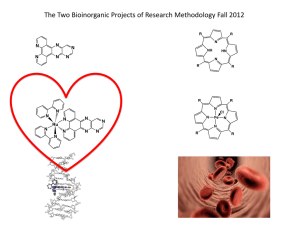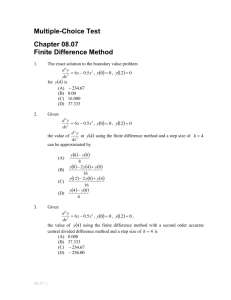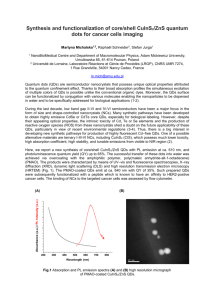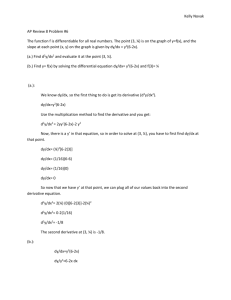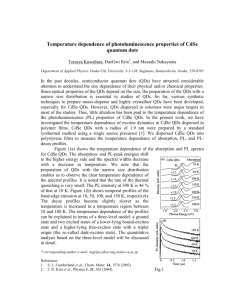Anodic electrogenerated chemiluminescence of Ru(bpy)32
advertisement
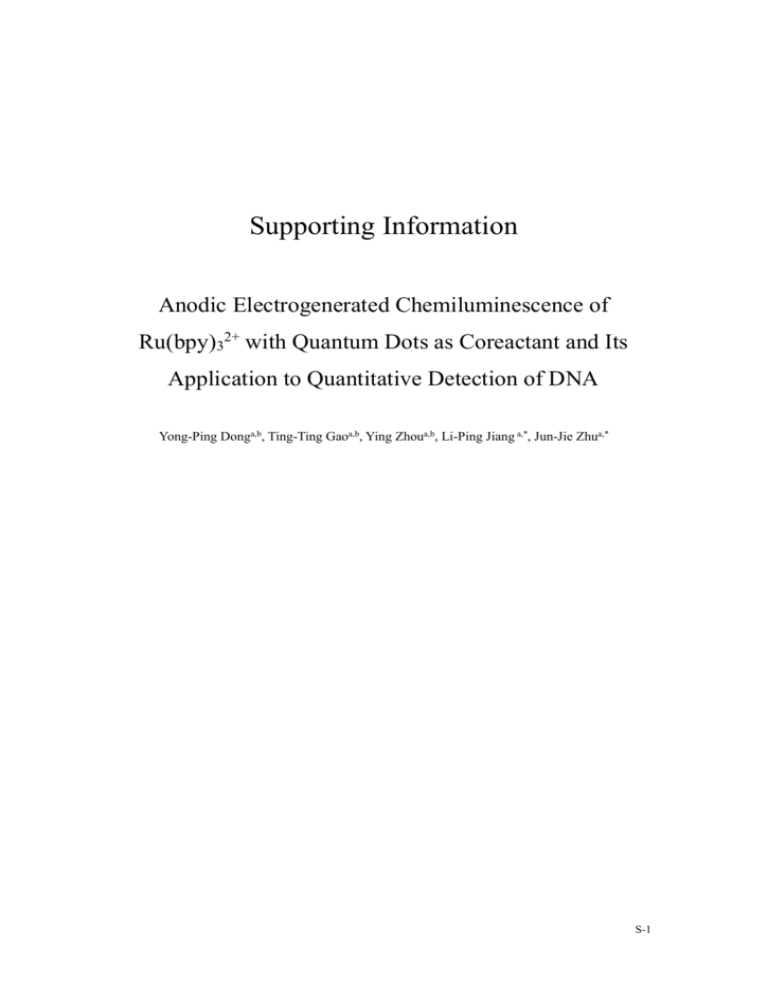
Supporting Information Anodic Electrogenerated Chemiluminescence of Ru(bpy)32+ with Quantum Dots as Coreactant and Its Application to Quantitative Detection of DNA Yong-Ping Donga,b, Ting-Ting Gaoa,b, Ying Zhoua,b, Li-Ping Jiang a,*, Jun-Jie Zhua,* S-1 0.6 120 0.4 80 0.2 40 0.0 0 300 400 500 FL intensity/a.u. Absorption Figure S1. High resolution transmission electron microscopy image of CdSe QDs. 600 Wavelength/nm Figure S2. UV-vis absorption and fluorescence spectra of CdSe QDs. S-2 4000 ECL intensity/a.u. Z"/ohm 1200 800 400 e b 0 c f B 3000 2000 1000 d 0 a 0 500 1000 1500 2000 2500 0 5 10 15 20 25 Volume of modified QDs/μL Z'/ohm Figure S3. (A) EIS of GCE modified with different amounts of CdSe QDs from 0.01 Hz to 105 Hz for [Fe(CN)6]3-/4- (10 mM, 1:1) in 0.1 mol L-1 pH 7.4 PBS containing 0.10 mol L-1 KCl. (a) bare GCE, (b) 5μL QDs, (c) 10μL QDs, (d) 15μL QDs, (e) 20μL QDs, (f) 25μL QDs. (B) Effects of the amount of the modified CdSe QDs on ECL signals. 6000 3000 5000 ECL intensity/a.u. ECL intensity/a.u. 4000 4000 3000 2000 1000 2000 0 -5.0 -4.5 -4.0 -3.5 -1 log CRu/mol L 1000 bare GCE in QDs/Ru(bpy)3 QDs/GCE in Ru(bpy)3 QDs/GE in Ru(bpy)3 2+ 2+ 2+ 0 -0.2 0.0 0.2 0.4 0.6 0.8 1.0 1.2 1.4 1.6 Potential/V vs SCE Figure S4. ECL curves of bare GCE in QDs/Ru(bpy)32+ mixing solution, QDs/GCE and QD/gold electrode (GE) in Ru(bpy)32+ solution. The inset is the relationship between ECL intensities at the QDs/GCE and Ru(bpy)32+ concentration. S-3 Absorption 0.6 B 0.4 DNA 2+ Ru(bpy)3 0.2 Ru(bpy)3 +DNA 2+ 0.0 FL intensity/a.u. 250 500 500 750 A 2+ Ru(bpy)3 250 2+ Ru(bpy)3 +DNA 0 500 600 700 800 Wavelength/nm Figure S5. FL spectra (A) and UV-vis absorption spectra (B) of Ru(bpy)32+ and Ru(bpy)32++DNA 10 8 Ru(bpy)3 2+ 6 Zeta potential/mV 4 2+ Ru(bpy)3 /probe 2 0 -2 -4 -6 QDs probe -8 -10 Figure S6. Zeta potential of Ru(bpy)32+, probe DNA, Ru(bpy)32+ intercalated probe DNA and QDs. S-4 Table S1. Comparison of different ECL biosensors for the detection of DNA. ECL system Linear range LOD Ref. 0.1 pM-1.0 nM 0.091 pM 1 5 fM -1.0 pM 1.7 fM 2 50 aM-5 fM 50 aM 3 CdTe@SiO2/ S2O8 0.1 nM-2 μM 0.03 nM 4 Ru(bpy)32+ doped Si NPs/TPA 0.1 pM-2 nM 0.05 pM 5 Ru(bpy)32+/CdSe QDs 0.5 fM-5.0 pM 0.19 fM This work 2+ Ru(bpy)3 /TPA Luminol/Pt NPs-CdS NCs/H2O2 2- CdS:Mn NCs/S2O8 2- 1. X. F. Tang, D. Zhao, J. C. He, F. W. Li, J. X. Peng, M. N. Zhang, Anal. Chem. 2013, 85, 1711-1718. 2. H. R. Zhang, J. J. Xu, H. Y. Chen, Anal. Chem. 2013, 85, 5321-5325. 3. Y. Shan, J. J. Xu, H. Y. Chen, Chem. Commun. 2009, 905-907. 4. W. Wei, J. Zhou, H. N. Li, L. H. Yin, Y. P. Pu, S. Q. Liu, Analyst, 2013, 138, 3253-3258. 5. Q. X. Sun, G. Z. Zou, X. L. Zhang, Electroanalysis, 2011, 11. 2693-2698. Table S2 Determination of target DNA added in human serum samples with the present ECL biosensor. Serum samples Added target DNA/pM Found target DNA/pM Recovery/% RSD/%, n= 3 1 0.95 95 3.3 5 5.08 100.2 3.1 1 1.02 102 4.5 5 4.98 99.6 2.8 Sample 1 Sample 2 S-5
